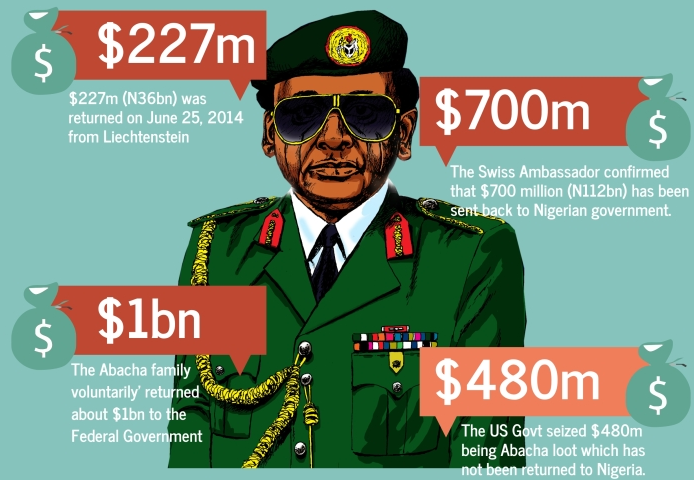- FG to Pay Swiss Govt $79m Commission
The Federal Government may have agreed to pay the Government of Switzerland $79m (N25.2bn) as part of conditions for the repatriation of almost $400m (N128bn) recovered from the family of the late military ruler, Gen. Sani Abacha.
The Chairman of the Civil Society Network Against Corruption, Mr. Olanrewaju Suraj, said this during a seminar to commemorate the 2016 International Anti-Corruption Day in Abuja on Friday.
The event was jointly organised by Nigerian anti-corruption agencies, the European Union, the United States and the United Nations Office on Drugs and Crime and had in attendance senior diplomats and politicians.
It will be recalled that the Swiss Ambassador to Nigeria, Eric Mayoraz, had said in July that his country would return $321m out of the Abacha loot to Nigeria.
However, Suraj, who was a member of a panel of discussants, said the original figure that was meant to be returned to Nigeria was about $400m.
He said the Nigerian Government had secretly agreed to forfeit $79m as part of negotiations.
Suraj said this was disgraceful as the Swiss Government was meant to pay Nigeria an interest instead of dictating the terms of agreement.
He said, “Unfortunately, the government goes to beg countries to get our money back rather than making demands, we appeal for the money and beg them to return it. We are fed with half information such that we even assume that we actually recover the amount stolen.
“I had a very funny experience and it is still ongoing. The $321m that the Swiss Government is meant to return to Nigeria, we discovered three weeks ago that the original money was about $400m. The legal process in Switzerland actually charged the Nigerian Government about $79m and that is why we are receiving $321m.
“The $321m is now to be returned to Nigeria with the condition that the World Bank will monitor how the funds will be spent. I cannot imagine anything more insulting.”
Attempts to speak with the spokesperson for the Swiss Embassy, Mr. Pascal Holliger, proved abortive as telephone calls were not responded to while he had yet to respond to a text message as of press time.
Also, an inquiry sent to the Office of the Attorney-General in Switzerland by email had yet to be responded to as of press time.
However, it will be recalled that the Minister of Foreign Affairs, Dr. Geoffrey Onyeama, had said in June that the government of former President Olusegun Obasanjo had paid the Swiss Government over $100m as commission for the return of Abacha’s loot.
He had said, “If you remember the Abacha loot in Switzerland at the time, Obasanjo’s government had to finally agree to give them 10 per cent of the amount. This was about $100m and so they returned $900m to Nigeria.
“If they (Swiss Government) had not agreed and said they wanted to keep the whole money, it would have been very difficult for us and that is why the anti-corruption summit and the initiative of President Muhammadu Buhari is really focused on these western countries to remove some of those barriers and lengthy procedures that are in place and make it possible for these people to delay (the payment).”
Meanwhile, the Minister of Mines and Steel Development, Dr. Kayode Fayemi, has described fighting corruption as a very expensive task.
He maintained that there was a need for the government to focus on crime prevention rather than crime fighting.
Fayemi, who spoke on the theme, ‘Corruption: An Impediment to the Sustainable Development Goals, said Buhari, administration would promote transparency.
The Country Representative of the UNODC, Cristina Albertin, lamented the high level of corruption in Nigeria and other developing nations.
She said 37 per cent of Nigeria’s gross domestic product would be lost by 2030 if corruption wasn’t curbed.
A spokesperson for the Swiss Department of Foreign Affairs, Noemie Charton, told our correspondent in an email that he would find out the situation.
The message read, “Thank you for your query. I have forwarded it to our colleagues in charge, and will get back to you in the course of next week.”


 Billionaire Watch3 weeks ago
Billionaire Watch3 weeks ago
 Startups4 weeks ago
Startups4 weeks ago
 News4 weeks ago
News4 weeks ago
 News4 weeks ago
News4 weeks ago
 Bitcoin4 weeks ago
Bitcoin4 weeks ago
 Naira4 weeks ago
Naira4 weeks ago
 Forex3 weeks ago
Forex3 weeks ago
 Treasury Bills4 weeks ago
Treasury Bills4 weeks ago
























